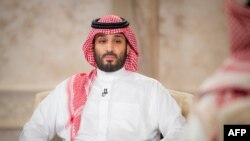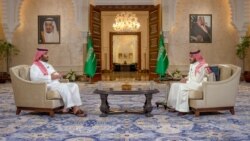Saudi Arabia's powerful Crown Prince says his country and the United States are partners, despite minor policy differences.
Crown Prince Mohammed bin Salman — or MBS, as he is known — presented his vision of Saudi foreign policy in a landmark TV interview Tuesday evening.
The crown prince said the Saudi government agrees with the new U.S. administration of President Joe Biden on most issues, and said the sides are working to find common ground on their disagreements.
"We are in agreement throughout 90 percent of the policy of President Biden and we hope to enhance it one way or another," MBS said. "And for the things we have some differences with them, about 10 percent, we try to neutralize the risk and reach an understanding about them. They are our partners for more than 80 years," he added, without specifying the discord.
One issue is Washington's human rights concerns, particularly over the 2018 killing of U.S.-based Saudi journalist Jamal Khashoggi in Istanbul.
Robin Wright, a joint fellow at the U.S. Institute of Peace and the Wilson Center, said that while the Biden administration initially spoke about recalibrating its relationship with Saudi Arabia, it realizes the kingdom's role in regional security.
"Saudi Arabia has an important place as the U.S. looks to all these conflicts it's trying to wind down, as it looks at what kind of stability it can create in the world's most volatile corner. As long as there are tensions between Iran and the United States, Saudi Arabia is going to play an important role," Wright said. "Iran's missile arsenal is becoming ever more powerful, with ever longer ranges. One of the challenges for us is what does MBS want? Is he trying to carve out a bigger ambition in the region?"
Another issue is Saudi and Gulf Arab concerns about the U.S. reengaging with Iran over a nuclear deal. MBS pointed to what he called Iran's negative influences, such as their nuclear program, their support for their regional proxy forces, and their ballistic missiles program.
"We're working with our partners to find solutions to these issues," he said.
The crown prince added that the Iran-backed Houthi militia in neighboring Yemen has rejected a Saudi peace plan, while continuing to bomb civilian and energy infrastructure targets inside Saudi Arabia with armed drones and ballistic missiles.
Yasmine Farouk, a visiting fellow at the Carnegie Endowment for International Peace, said Washington must tamp down Saudi expectations about what a possible Iran nuclear deal could achieve.
"The idea that the U.S. is going to negotiate a whole comprehensive deal that is going to get Iran out of all Arab countries is something that the Saudis need to let go, and the U.S. is going to negotiate on behalf of the Saudis and protect Saudi interests as good as they would themselves is something the Saudi need to let go," Farouk said. "The U.S. must boost the defense of Saudi Arabia in a way that is compatible with the new attacks and the new forms of attacks from Iran."
The U.S. special envoy for Iran, Robert Malley, said Washington is trying to keep its Gulf allies informed of any progress in talks and take into account security concerns they have that were not originally addressed.





